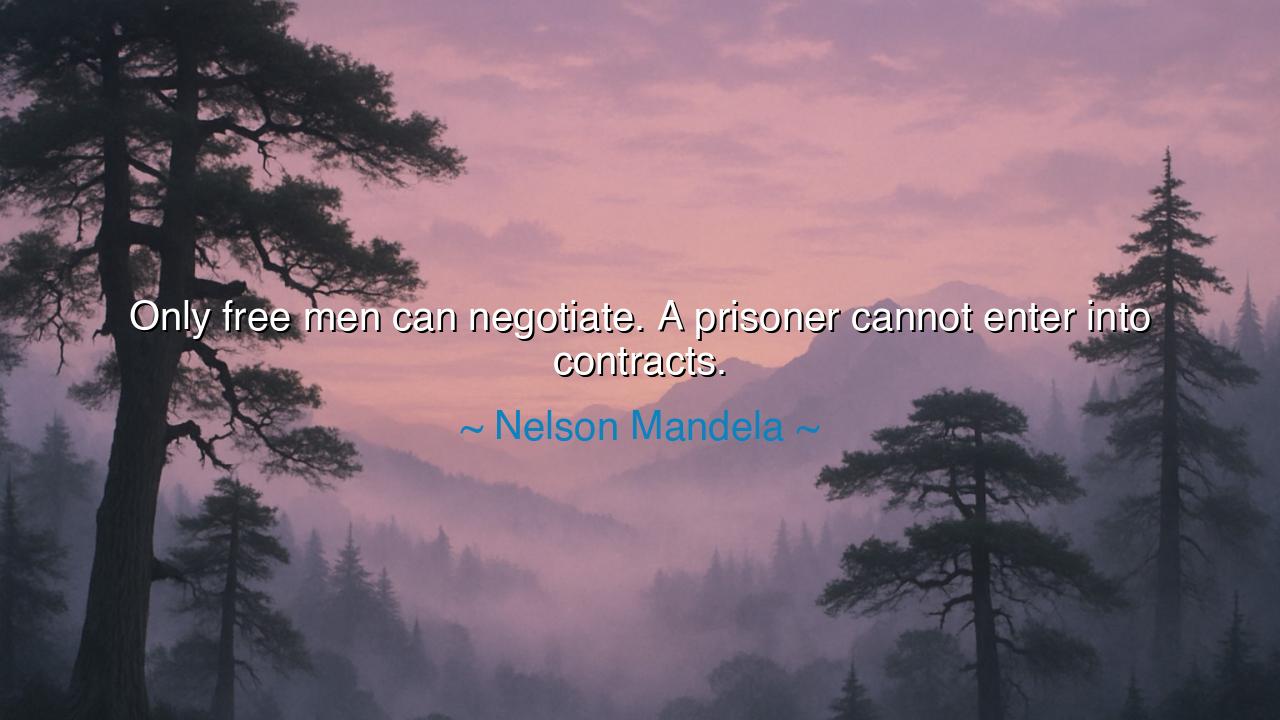
Only free men can negotiate. A prisoner cannot enter into






Hear the words of Nelson Mandela, the great liberator of South Africa: “Only free men can negotiate. A prisoner cannot enter into contracts.” These words are not mere rhetoric; they are the voice of a man who endured long captivity and yet refused to compromise the dignity of his people. They echo with the wisdom of one who understood that true dialogue cannot be built on chains, and that justice cannot be born from submission.
The meaning is profound. Freedom is the foundation of all negotiation. To negotiate is to stand as an equal, able to choose, able to accept, able to reject. A prisoner, bound in body and stripped of power, cannot sign a contract with fairness, for his choices are not truly his own. To accept terms in bondage is not negotiation—it is surrender. Thus Mandela declared to the rulers of apartheid: until his people were free, there could be no true agreement, no peace that was just, no reconciliation that was real.
The origin of these words lies in Mandela’s years of imprisonment on Robben Island and beyond. The apartheid government sought to bargain with him, offering conditional release if he would renounce the struggle. But Mandela refused. He knew that to negotiate while still a captive would betray his cause. He would not speak as a supplicant; he would wait until he stood as a free man, for only then would his words carry the weight of equality. His refusal became a symbol of strength, and his steadfastness preserved the dignity of the liberation movement.
History gives us many echoes of this truth. Consider the Magna Carta, signed not by peasants in chains but by barons who stood strong before their king. Consider also the negotiations after the American Revolution: only after independence was secured could the colonists treat with Britain as equals. The prisoner may plead, but only the free man can bargain. This is the eternal law of justice—that true contracts require balance, and balance requires liberty.
This truth is not only for nations but for every life. Whenever one is enslaved—by fear, by addiction, by oppression, or by lies—one cannot make true choices. Agreements made in bondage are fragile, tainted, and often destructive. Only when one has broken free, when one stands firm in dignity and clarity, can one enter into bonds that uplift rather than bind. Thus Mandela’s words speak not only of politics, but of the soul: only the free can choose well.
The lesson for us is clear: guard your freedom, for it is the foundation of dignity. Do not allow yourself to be trapped in agreements born of fear, coercion, or desperation. Seek first to be free—free in thought, free in conscience, free in truth—then let your negotiations and contracts flow from that strength. For what is signed in chains is no covenant at all, but what is chosen in liberty is enduring.
Practical action flows from this wisdom. In your personal life, before committing to great decisions, ask yourself: am I free to choose, or am I acting under pressure that corrupts my will? In your work, your relationships, your society, seek to create conditions where all may speak as equals. Defend the oppressed, for until they are free, they cannot truly negotiate their lives. In this way, Mandela’s words become not only a call to political justice, but a guide for daily integrity.
Take this as a guiding flame: “Only free men can negotiate. A prisoner cannot enter into contracts.” Freedom is the root of justice; equality is the soul of peace. Let no man accept terms in chains, and let no people believe themselves bound by agreements made in fear. For only the free can speak with truth, and only the free can build a world of lasting dignity.






AAdministratorAdministrator
Welcome, honored guests. Please leave a comment, we will respond soon